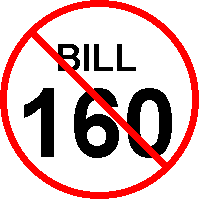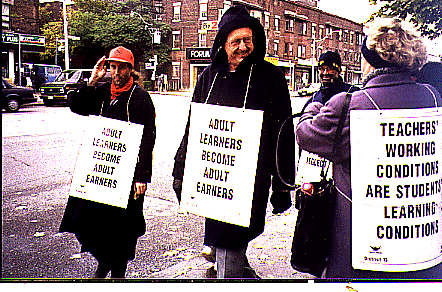- Day 3: Wednesday 29 Oct.
- Day 4: Thursday 30 Oct.
- Day 5: Friday 31 Oct.
- Day 6: Monday 3 Nov.
- Defeat at the Political Level
- The Curriculum of the Political Street Classroom
- Lessons Concerning the Media
Part TWO:Taking it to the Political Street: University Ave.Introduction to Part TWOPraxis: the Day by Day Experiences:The Lessons from the Political Struggle |
. 7 9 12 15 18 |

PART TWO:
|
.
.
.
.
.
.
DAY THREE: Wednesday 29 October AND I ALWAYS THOUGHT
AND I ALWAYS THOUGHT And I always thought:the very simplest words Must be enough. When I say what things are like Everyone's heart must be torn to shreds. That you'll go down if you don't stand up for yourself Surely you see that Bertolt Brecht
This morning the government presented their evidence to the court in the
hope of winning an injunction to end the strike.
The Toronto Star headline read
"Lawyers plan bid to stop walkout"
In the afternoon, we all went to the Mowat Block for a large
demonstration. There were excellent speeches, including several by
young elementary school students, parents, and others. (see photo below)
the author, David Fletcher (left) and three teachers in front of Oakwood
C. I.
|
DAY FOUR: Thursday 30 October By now we were getting quite good at picketing. Our shifts were
organized and punctual. The major news today had to do with the talks
between the union leaders and the government. While our
representatives had made some offers (a five point plan) the Minister,
Johnson had announced the intention to introduce an
ammendment to 160
which would vindictively remove principals and vice principals from the
bargaining
units, thereby taking them out of the unions. On the other hand, he also
said that non-certified teachers would only be used to compliment and not
replace certified teachers. Few of us were hopeful that these talks would
end the strike.
By now we were getting quite good at picketing. Our shifts were
organized and punctual. The major news today had to do with the talks
between the union leaders and the government. While our
representatives had made some offers (a five point plan) the Minister,
Johnson had announced the intention to introduce an
ammendment to 160
which would vindictively remove principals and vice principals from the
bargaining
units, thereby taking them out of the unions. On the other hand, he also
said that non-certified teachers would only be used to compliment and not
replace certified teachers. Few of us were hopeful that these talks would
end the strike.
The major topics of conversation were what to do if the injunction were granted and how to escalate the protest to a general strike. In regards to the latter, Syd Ryan, Ontario president of the Canadian Union of Public Employees, was very vocal. He said that at an OFL meeting Monday he would call for such a general strike and urge that a date be set. There were also things happening at OISE/UT. There was an Information session during which panelists expressed concern that Bill 160 dealt mainly with issues of control and money rather than changes that would really improve education. Research was evoked which showed that this approach does not work to bring about improvements in teaching or learning in practice. The headline of the Toronto Star on this day read: ". 'Lawless' teachers attacked by Harris" That afternoon I went to my 3308F course at OISE. After a short discussion in class we decided that as a group we would attend a special meeting of the Faculty Council. At this meeting two motions were passed unanimously opposing Bill 160 and supporting the teachers' strike. In my mind, however, such 'motherhood' motions meant little. I was afraid that starting next week, after the injunction passed and we stayed out on the picket lines, that we would be facing fines and the imprisonment of our leaders. Something with more teeth was called for. The mood of the house was such that I felt it to be a opportunity to push the envelope a little and propose a motion that might not otherwise be moved. Unfortunately, as I am neither a faculty member nor a student representative I could not put forward a motion. Professor Joel Weiss came forward though and said that my motion had sufficient merit that it deserved to be moved and discussed. The motion was: "BIRT, if the government of Ontario exercises repressive measures (such as imprisonment and/or fines), against striking Ontario Teachers' Federation members, the OISE/UT Faculty Council would, within twenty-four hours, call for a general withdrawl of services with the intent of shutting down OISE/UT." (see attached) The motion at first received anoying nervous laughter but then settled down into a reasonable discussion --including support. I think to the surprise of many, when it came to a vote, it carried with a large majority. This was reported in the Star the next day as "almost unanimous". Joel Weiss was also quoted in this Star article. (see attached).
On this day, our union leaders announced a five point plan which was to
be presented tohe government at 7:00 pm. This plan offered many
compromises, including allowing all sections of the bill dealing with
funding; an offer to negotiate amalgamated school boards; refering the
issue of non-certified teachers to a special task force; and negotiate
length of school year. In hindsight not alot, but the government still
refused to even meet with the leaders. Instead, Johnson issued the press
release which announced his intention to introduce an ammendment removing
principals and vice principals from the unions. This move was not only
petty and vindictive, it was also inflammatory and polarizing. In a
negotiating situation, introducing new and controversial demands is "not
bargaining in good faith" and is illegal for good reasons --its inevitably
provokes conflict.
click here |
DAY FIVE: Friday 31 October
|
DAY SIX: Monday 3 November
After picketing a while in the early morning, I went to an information picket in front of OISE/UT organized by both students and staff. There was a good turn-out and the speakers there were very strong. From there I joined my collegues at the Area West Education Office at D'Arcy and Beverley. It was there in the afternoon that we heard the news of Justice MacPherson's decision not to grant the injuction. The immediate reaction on the line and from passers by was celebratory. We cheered and passing cars honked and waved. Eileen Lennon called it a "moral victory" for teachers. The Toronto Star headline today was "Tories, teachers are still talking". At 4:00 this afternoon District 15 had a special meeting for all Branch Presidents and picket captains at the Steelworkers' Hall on Cecil St. We voted unanimously to urge the provincial OSSTF and the OTF to approach the OFL about a general strike. There was some discussion about how to deal with strike-breakers, but there were so few of them in Toronto that most of us had mixed feelings. In addition to this ambiguity there was the fact that it was not a "conventional" strike but rather a protest. Therefore the principles we apply to strike-breaking were questionable here. At this time, there also came to the surface, a variety of opinions. Some members felt that we should be getting strike pay. We were told that this was not an option because the conditions under which the strike fund monies are to be used is strickly restricted to legal strikes --which this was not. Some members also expressed concern that the leadership was not taking a strong enough position. For example, Marshall Jarvis had said: "We're not out to gut the bill". Phyllis Benedict suggested that only the "more harmful parts" of Bill 160 be removed. Many members at the meeting insisted that we stand firm that we did indeed want the bill gutted. |
The Lessons from the Political Struggle
Defeat at the Political Level The Curriculum of the Political Street Classroom
Lessons Concerning the Media
|
Click here to see a collection of cartoons on the protest (from a variety
of sources)

Details of related events in chronological order









